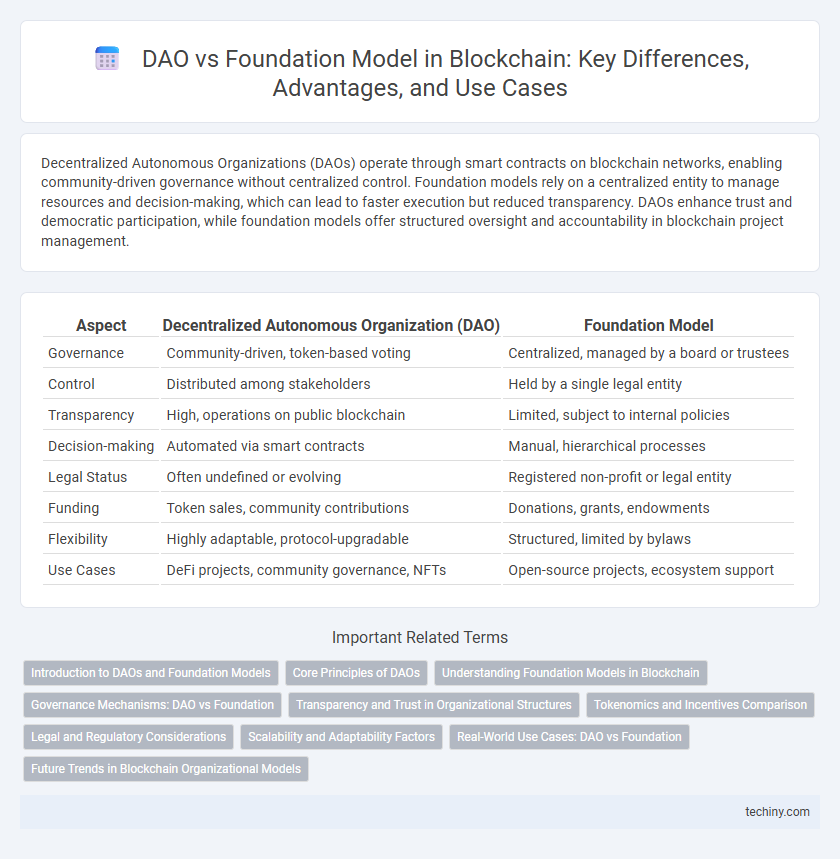Decentralized Autonomous Organizations (DAOs) operate through smart contracts on blockchain networks, enabling community-driven governance without centralized control. Foundation models rely on a centralized entity to manage resources and decision-making, which can lead to faster execution but reduced transparency. DAOs enhance trust and democratic participation, while foundation models offer structured oversight and accountability in blockchain project management.
Table of Comparison
| Aspect | Decentralized Autonomous Organization (DAO) | Foundation Model |
|---|---|---|
| Governance | Community-driven, token-based voting | Centralized, managed by a board or trustees |
| Control | Distributed among stakeholders | Held by a single legal entity |
| Transparency | High, operations on public blockchain | Limited, subject to internal policies |
| Decision-making | Automated via smart contracts | Manual, hierarchical processes |
| Legal Status | Often undefined or evolving | Registered non-profit or legal entity |
| Funding | Token sales, community contributions | Donations, grants, endowments |
| Flexibility | Highly adaptable, protocol-upgradable | Structured, limited by bylaws |
| Use Cases | DeFi projects, community governance, NFTs | Open-source projects, ecosystem support |
Introduction to DAOs and Foundation Models
Decentralized Autonomous Organizations (DAOs) operate on blockchain technology, enabling transparent decision-making through smart contracts without centralized control, fostering community-driven governance. Foundation models in blockchain serve as centralized entities that provide structural support, funding, and legal frameworks to guide project development and maintain ecosystem stability. Understanding the contrasting roles of DAOs and foundations highlights the shift from centralized authority towards decentralized and democratic participation in blockchain governance.
Core Principles of DAOs
Decentralized Autonomous Organizations (DAOs) operate on core principles of transparency, collective governance, and immutable code execution, enabling participants to propose and vote on decisions without centralized control. Unlike the Foundation model, which relies on a centralized entity to manage funds and strategic direction, DAOs distribute authority through token-based voting systems that incentivize participation and accountability. This trustless architecture enhances security and aligns interests across stakeholders by codifying rules in smart contracts on blockchain networks.
Understanding Foundation Models in Blockchain
Foundation models in blockchain serve as centralized entities managing protocol development, funding, and governance, contrasting with DAO's decentralized decision-making frameworks. These models provide structured oversight and resource allocation, ensuring consistent project direction and regulatory compliance. Understanding the role of foundation models is crucial for evaluating governance efficiency, community engagement, and long-term sustainability within blockchain ecosystems.
Governance Mechanisms: DAO vs Foundation
Decentralized Autonomous Organizations (DAOs) leverage blockchain-based smart contracts to enable transparent, community-driven governance where token holders directly vote on proposals, ensuring decentralized decision-making and reducing single points of failure. Foundation models, by contrast, centralize governance within a core team or board, which controls decision-making processes and resource allocation, often resulting in faster but less democratic outcomes. The DAO's consensus mechanisms promote inclusivity and trustlessness, while foundation models rely on hierarchical authority, impacting scalability and adaptability in blockchain project management.
Transparency and Trust in Organizational Structures
Decentralized Autonomous Organizations (DAOs) utilize blockchain technology to ensure transparent governance through smart contracts, enabling real-time verification of decisions and financial flows by all members, which significantly enhances trust. Foundations, often governed by traditional hierarchical structures, typically rely on centralized oversight and periodic reporting that may limit transparency and delay accountability. The immutable ledger characteristic of DAOs fosters continuous trust by providing open-access records, contrasting with the foundation model's dependence on internal audits and external assurances.
Tokenomics and Incentives Comparison
Decentralized Autonomous Organizations (DAOs) leverage tokenomics to align stakeholder incentives through transparent, on-chain governance and token-based voting rights, fostering community-driven decision-making and resource allocation. In contrast, Foundation models rely on centralized control with predefined incentive structures, often distributing tokens as grants or rewards without direct participatory governance. DAOs create dynamic incentive mechanisms by integrating token staking, rewards, and penalties, enhancing user engagement and commitment, while Foundations maintain more static economic models focused on sustainability and long-term project support.
Legal and Regulatory Considerations
Decentralized Autonomous Organizations (DAOs) often face complex legal challenges due to their lack of centralized governance and unclear jurisdictional status, complicating regulatory compliance and liability issues. Foundation models, typically established as legal entities, provide a clearer framework for regulatory adherence and asset protection, offering structured governance and transparency. Understanding the distinctions in legal recognition and regulatory obligations between DAOs and foundation models is crucial for developers and participants navigating blockchain governance frameworks.
Scalability and Adaptability Factors
Decentralized Autonomous Organizations (DAOs) leverage blockchain technology to enable scalable, community-driven governance through smart contracts, allowing rapid adaptation to changing conditions without centralized control. Foundation models rely on hierarchical structures, which can limit scalability due to bureaucratic decision-making and slower response times in evolving environments. DAOs offer enhanced adaptability by enabling transparent, real-time voting and protocol updates, facilitating smoother scalability compared to traditional foundation models constrained by rigid organizational frameworks.
Real-World Use Cases: DAO vs Foundation
Decentralized Autonomous Organizations (DAOs) enable transparent, community-driven governance of blockchain projects like MakerDAO and Uniswap, where token holders vote on protocol changes. In contrast, foundation models such as the Ethereum Foundation oversee development and funding with centralized decision-making, exemplified by initiatives supporting Ethereum's ecosystem growth. Real-world use cases reveal DAOs excel in fostering decentralized participation, while foundation models provide structured support and continuity.
Future Trends in Blockchain Organizational Models
Decentralized Autonomous Organizations (DAOs) leverage blockchain technology to enable transparent, community-driven governance through smart contracts, contrasting with the traditional Foundation model that relies on centralized leadership and hierarchical structures. Future trends indicate increasing adoption of hybrid models combining DAO mechanisms with foundational oversight to balance scalability, regulatory compliance, and decentralized decision-making. Enhanced interoperability, improved on-chain governance protocols, and integration of AI in voting systems are expected to drive the evolution of blockchain organizational frameworks.
Decentralized Autonomous Organization (DAO) vs Foundation model Infographic

 techiny.com
techiny.com